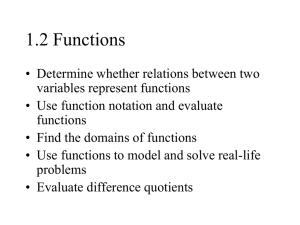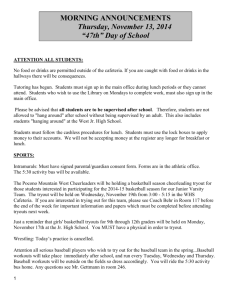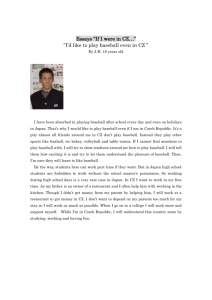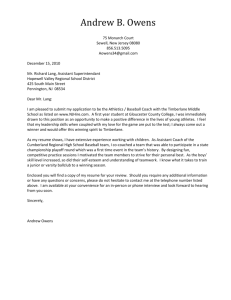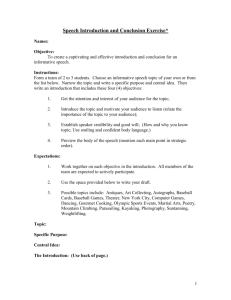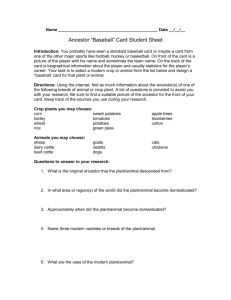Thank you for registering for the Under Armour Baseball Factory
advertisement
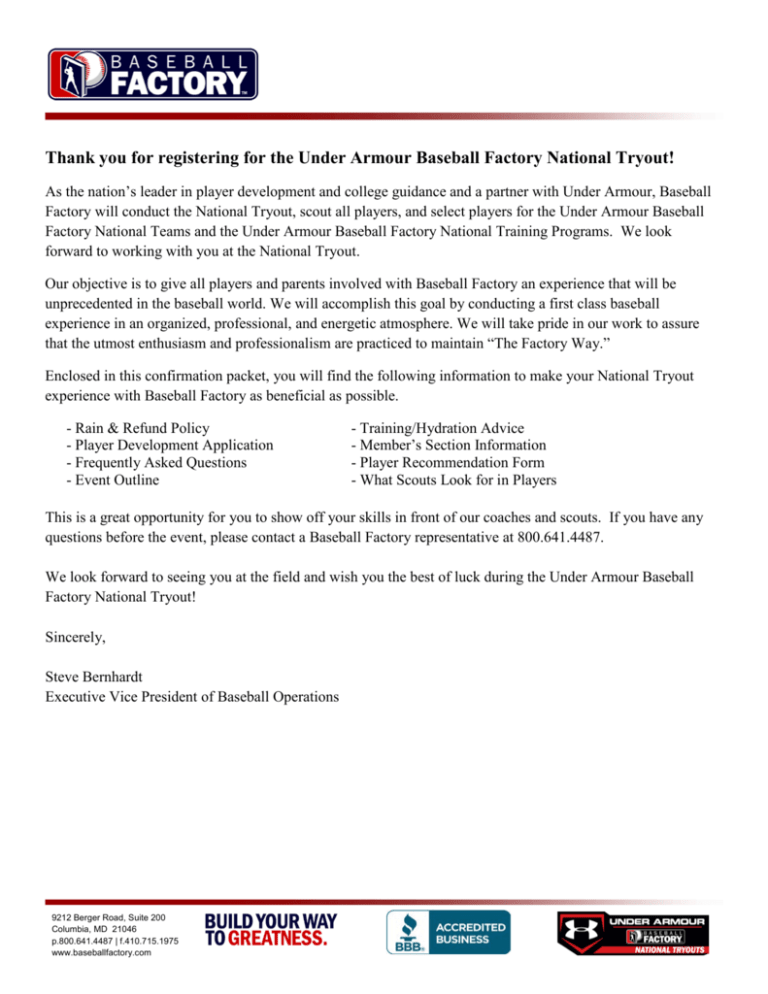
Thank you for registering for the Under Armour Baseball Factory National Tryout! As the nation’s leader in player development and college guidance and a partner with Under Armour, Baseball Factory will conduct the National Tryout, scout all players, and select players for the Under Armour Baseball Factory National Teams and the Under Armour Baseball Factory National Training Programs. We look forward to working with you at the National Tryout. Our objective is to give all players and parents involved with Baseball Factory an experience that will be unprecedented in the baseball world. We will accomplish this goal by conducting a first class baseball experience in an organized, professional, and energetic atmosphere. We will take pride in our work to assure that the utmost enthusiasm and professionalism are practiced to maintain “The Factory Way.” Enclosed in this confirmation packet, you will find the following information to make your National Tryout experience with Baseball Factory as beneficial as possible. - Rain & Refund Policy - Player Development Application - Frequently Asked Questions - Event Outline - Training/Hydration Advice - Member’s Section Information - Player Recommendation Form - What Scouts Look for in Players This is a great opportunity for you to show off your skills in front of our coaches and scouts. If you have any questions before the event, please contact a Baseball Factory representative at 800.641.4487. We look forward to seeing you at the field and wish you the best of luck during the Under Armour Baseball Factory National Tryout! Sincerely, Steve Bernhardt Executive Vice President of Baseball Operations 9212 Berger Road, Suite 200 Columbia, MD 21046 p.800.641.4487 | f.410.715.1975 www.baseballfactory.com Rain & Refund Policy Under Armour Baseball Factory National Tryout: Rain Policy If your session is officially rained out: • You have the option of applying payments to any other Baseball Factory event. • You may have your money refunded in full within 60-90 days. Please note: Even if it is raining in your area, you will need to report to the stadium unless contacted by Baseball Factory. An event will be considered an “official rainout” when the entire event is cancelled in full. If the following occurs all players will be eligible to attend another Under Armour Baseball Factory National Tryout at no additional charge: • No baseball activities are able to be completed on the field (i.e. field is ruled unplayable and only batting cages or bullpen are able to be used due to conditions) • Our scouts are unable to develop a complete report on the players based on limitations caused by the rain • Our scouts are unable to develop enough of a report for national team and training camp selections to be made Under Armour Baseball Factory National Tryout: Refund Policy Tryout: For all players participating in the Under Armour Baseball Factory National Tryout ($99 one position, $199 two positions), all fees will be non-refundable. Fees will be transferable to another event if the player notifies Baseball Factory of his intent to cancel at least 48 hours in advance of the tryout. All other player fees are not transferable. Premium Video Program: For all players participating in the Under Armour Baseball Factory National Tryout and Premium Video Program ($499 one position, $599 two positions), the following policy will apply: • On all Premium Video Program sessions any payment made toward the event (full payment or deposit) will be transferred to another event date if the player is unable to attend. 9212 Berger Road, Suite 200 Columbia, MD 21046 p.800.641.4487 | f.410.715.1975 www.baseballfactory.com Baseball Factory Player Development Application BRING THIS COMPLETED FORM WITH YOU TO YOUR EVENT Player Information Name _______________________________________________ Home Address ________________________________________ City _________________________ State ______ Zip ________ Home Phone _________________________________________ Player Cell Phone _____________________________________ Player Email _________________________________________ Player’s Date of Birth __________________________________ Family Information Father’s Name ________________________________________ College(s) Attended ___________________________________ Occupation___________________________________________ Work #___________________ Cell # _____________________ Email: ______________________________________________ Mother’s Name _______________________________________ College(s) Attended ___________________________________ Occupation___________________________________________ Work #__________________ Cell # ______________________ Email: ______________________________________________ Please list any baseball-playing younger brothers (list name and age): ____________________________________ ____________________________________________________ Academic Information Overall GPA (Entire High School Career) __________________ PSAT Score: _______________ ACT Score: _____________ SAT Total: ______ Math: _____ Verbal: ______ Writing: _____ What other varsity sports do you play in high school? ____________________________________________________ Do you plan to play another sport in college? ________________ If yes, list sport and the position you play – such as QB? ____________________________________________________ Roster Information Primary Position (List only ONE) _________________________ Secondary Position (List only ONE) _______________________ Year of High School Graduation __________________________ High School __________________________________________ School Size: (circle) S M L Type: Public/Private School Begins on: _________/________/_________ School Ends on: _________/________/_________ High School Baseball Coach_____________________________ Bats (Right/Left/Switch) Throws (Right/Left) Height:________________ Weight: _______________ Travel/Summer Ball Team ______________________________ Additional Information Jersey Size M,L,XL,XXL _______ Shoe Size_______ Do you train with a pro instructor (Y/N): ___________________ What Indoor Baseball Facility do you utilize for workouts? ____________________________________________________ INVALID/DECLINED ACCOUNT POLICY: Please note, if you elect to pay your balance on a monthly payment plan, you are responsible to ensure that the monthly payment will be processed on the date that it is scheduled with the payment information provided. Should the credit card or ACH information come back as invalid or declined in a given month, you will be subject to a $25 fee for that month, only if the issue goes unresolved after 48 hours. Commitment Agreement Our National Teams and Training Camps are comprised of players who are selected from National Tryouts, Premium Video Programs and Showcases up to six months in advance. Once a player is selected and he accepts to play and represent Baseball Factory, it is important to understand that he is committing 100% to his team and must be ready to compete and train. Our national player selection process allows us to choose players across the entire U.S.A. You are competing with players from all 50 states for a spot on one of our prestigious teams. If you are selected and commit to play, both Baseball Factory and your teammates are counting on you. Remember, the Baseball Factory program will enhance your abilities and experience to better prepare you for college baseball. College coaches expect you to be prepared to play at the collegiate level. Play hard and have fun! Refund/Payment Schedule Policy For all players participating in either the Under Armour Baseball Factory National Tryout ($99) or Under Armour Baseball Factory National Tryout - Two Positions ($199), all fees will be non-refundable. Fees will be transferable to another event if the player notifies Baseball Factory of his intent to cancel at least 48 hours in advance of the tryout. All other player fees are not transferable. PVP Programs have a nonrefundable, but transferable policy. Any payment made toward the event (full payment or deposit) will be transferred to another event date if the player is unable to attend. If you are required to make ongoing monthly payments to finalize your registration fees to attend a Baseball Factory National Tournament, Training, or Recruiting Event (including any fundraising efforts that you may be seeking for additional support), you are committed to adhering to the payment plan that has been created for you by The Baseball Factory staff. In the event of any default under the terms of this agreement, you agree to be responsible for any and all collections costs, including court costs, interest and reasonable attorneys' fees of twenty (20%) of any and all monies due. If any dispute arises out of the terms and conditions of this Agreement, you hereby agree that Howard County, Maryland shall be the exclusive jurisdiction for resolution of any and all disputes and that Maryland law shall be applied to any action brought in state or federal court. For all Baseball Factory Player Development events (tournaments and training) and the company's Exclusive College Recruiting Program, that result in player cancellation in excess of 30 days from the event (including injuries, weather related occurrences, personal emergencies, schedule changes, and travel delays) any payments made prior to an event are transferable* without penalty to a future Baseball Factory event, as long as the event is within the same calendar year. For all cancellations that occur inside 30 days from the event, any payments made prior to this point will forfeited and may not be transferred to another event, or refunded, unless the player provides a doctor’s note clearly stating that he is physically unable to perform at the event. If a doctor’s note is provided, any monies paid will be transferable to a future Baseball Factory event within the same calendar year. Player fees will not be refunded. *Excluding the Arizona Senior Fall Classic. For the Arizona Senior Fall Classic, a $1,000 non-refundable, non-transferable deposit is required for registration. Baseball Factory Waiver/Agreement I do hereby waive, release and discharge Baseball Factory and the respective staffs, employees and ensigns and all sponsors, of and from any and all rights and claims for damages resulting from injury of my person or property, which may be sustained or suffered by me in connection with my association with or participating in, or arising out of my traveling to or from the Baseball Factory event. I hereby certify that my child is fully capable of participating in the Baseball Factory event and that my child is healthy and has no physical or mental disabilities or infirmities that would restrict full participation in these activities. If my child does not have health insurance, he and our family will be responsible for all medical costs for him as associated with participation in the Baseball Factory event. I do hereby authorize Baseball Factory and its partners to: record my child’s participation and appearance on video tape, audio tape, film, photograph, or any other medium; use my name or my child’s name, likeness, voice and biographical material in connection with these recordings, and exhibit or distribute such recordings in whole or in part with restrictions or limitations for any educational or promotional purpose. I do hereby authorize Baseball Factory to email or mail information to all addresses and email addresses provided to Baseball Factory. We, the parent(s), or legal guardian, agree to the above waiver and release and we join therein. Please sign below to acknowledge understanding of company’s Commitment Agreement, Refund/Payment Schedule Policy (including the Invalid/Declined Account Policy), and Waiver Agreement: _____________________________________________________________________________ Player’s Signature _____________________________________________________________________________ Parent/Guardians Signature __________________ Date Name of Health Insurance Provider _________________________________________________ BBB Rating: A+ Policy Number _________________________________________________________________ Frequently Asked Questions How to get the most out of your Baseball Factory experience • When should I arrive at the stadium? Be there one hour before the scheduled start of your session for registration. • What should I wear? Prepare for the session as though it were a baseball game. Baseball pants, cleats, and equipment are appropriate. Please bring cleats AND turf shoes or tennis shoes. • Should parents attend the sessions? It is highly recommended that parents attend the sessions with the players. Our Player Development Coordinators will be at the session providing all parents with information about the college recruiting process in a valuable seminar! • When do I need to send the Player Development Application back? PLEASE BRING THE PLAYER DEVELOPMENT APPLICATION WITH YOU TO YOUR EVENT. • Are the players going to be served lunch or a snack? The players will be supplied with water, but not with lunch or a snack. We want to get as much baseball in as we can in the time allotted; however, the players are welcome to bring a drink and a snack for themselves if they would like, but it is also important to eat and drink appropriately prior to the session. • Now that my session is complete, how can I get more involved? There are multiple ways to get more involved with Baseball Factory: - Utilize your Player Development Coordinator—Contact your Coordinator for more information about other Baseball Factory programs. Your coordinator is also available to answer any questions you may have about the college recruiting process and how you can take an active role. - Member Section—Access our member section online at www.baseballfactory.com. This section of our web site is available only to players in our program and will provide you with additional valuable information on the college recruiting process. We highly encourage you to take advantage of the information provided in this section. 9212 Berger Road, Suite 200 Columbia, MD 21046 p.800.641.4487 | f.410.715.1975 www.baseballfactory.com Event Outline What to expect from your Under Armour Baseball Factory National Tryout SEMINAR: Parents / Players PLAYER STRETCH 60-YARD DASH CATCHING: player assessment INFIELD: player assessment OUTFIELD: player assessment PITCHING: player assessment ARM STRENGTH STATION: player assessment BATTING PRACTICE: player assessment DISCUSSION: final words – player departure 9212 Berger Road, Suite 200 Columbia, MD 21046 p.800.641.4487 | f.410.715.1975 www.baseballfactory.com Training/Hydration Advice Dear Parents: Welcome to Baseball Factory. My name is Charlie Strasser, certified athletic trainer for the Baseball Factory. This letter is to help your son prepare for your session. Always be prepared for HOT and HUMID weather. The Hydration Game Plan 1. Wear light colored clothing. 2. Drink plenty of fluids the night before and the morning of the camp. (Gatorade, etc.) Stay away from carbonated drinks. 3. Bring a cooler with you filled with extra drinks. This will help keep you hydrated during the day. Water will be provided, but water does not provide the essential nutrients needed during a hot and humid day. 4. Drink fluids during every opportunity throughout the day. 5. Athlete should drink 20oz of fluids for loss of each pound loss during the day. 6. Encourage your son to speak up if they are not feeling well or are experiencing any signs of dehydration or heat illness. 7. A good sign for determining hydration level is the color of their urine. Clear = hydrated ******* Dark = dehydrated. In conclusion, we at the Baseball Factory want your son competing at their very best. Staying hydrated and healthy is one way to obtain maximum performance. Sincerely, Charlie Strasser Certified Athletic Trainer Over 25 years in the industry with teams including the LA Dodgers and Cleveland Cavaliers 9212 Berger Road, Suite 200 Columbia, MD 21046 p.800.641.4487 | f.410.715.1975 www.baseballfactory.com Member’s Section Information Take advantage of the valuable information our skilled professionals have provided on the college recruiting process In order to get the most out of your Baseball Factory experience, it is essential that you take advantage of the “Member’s Section” of our web site. The Member’s Section provides you with detailed, valuable information on the college recruiting process as well as what steps you should take in order to fully market yourself to the college programs that fit your needs. In order to access the Member’s Section, you will need to follow these steps: 1. 2. 3. 4. Log on to our web site at www.baseballfactory.com In the top left corner of the site, please click on the button called “LOGIN.” Make sure to use the Player Login, not Coach. You can also go directly to the Member’s Section by using this link: www.baseballfactory.com/member_login.asp 5. Enter your user id and password Your user id is the player email address that you provided Baseball Factory with when initially registering for your Baseball Factory program. If you do not remember the player email address you submitted, did not give us your email address, or are having trouble signing in, contact a customer service representative at 800.641.4487 and we can help get you started with the Member Section. Your password will be: baseballfactory If you have any questions, concerns, or problems taking advantage of this valuable part of your Baseball Factory program, please call 800.641.4487. 9212 Berger Road, Suite 200 Columbia, MD 21046 p.800.641.4487 | f.410.715.1975 www.baseballfactory.com Player Recommendation Form Help some of your talented teammates by recommending them to this Program! As a high school player, we know it can be a difficult task to begin the college recruiting process; however, your involvement with Baseball Factory illustrates your commitment to playing baseball at the next level. Now, it is up to you to help some of your talented teammates take their important first step. Please recommend some of your top teammates/opponents to Baseball Factory: Your Name: _______________________________ Recommended Players 1. Name: _____________________________ Address: _____________________ City: ______________ St: ____ Zip: _____ Phone #: ___________________ Position: _____ Graduation Year: _____________ Your Connection with the player: ________________________________________ 2. Name: _____________________________ Address: _____________________ City: ______________ St: ____ Zip: _____ Phone #: ___________________ Position: _____ Graduation Year: _____________ Your Connection with the player: ________________________________________ 3. Name: _____________________________ Address: _____________________ City: ______________ St: ____ Zip: _____ Phone #: ___________________ Position: _____ Graduation Year: _____________ Your Connection with the player: ________________________________________ Submit this form by faxing it to Baseball Factory at 410.715.1975 or by mail: 9212 Berger Road, Suite 200, Columbia, MD 21046. You can also bring it with you to your event. 9212 Berger Road, Suite 200 Columbia, MD 21046 p.800.641.4487 | f.410.715.1975 www.baseballfactory.com What Scouts Look for in Players Tips on how to get noticed by College Coaches and Pro Scouts It is important to keep a few things in mind whey you play in front of college coaches and professional scouts, and we have included the following information and hope that it will help you to make the most of your opportunities. Key points for hitters as well as a general breakdown by position are included below, taken from the book, Breaking into the Big Leagues. Excerpts taken from the book: Breaking IntoThe Big Leagues, by Al Goldis and Rick Wolff 9212 Berger Road, Suite 200 Columbia, MD 21046 p.800.641.4487 | f.410.715.1975 www.baseballfactory.com What Scouts Look For in Pitchers When observing a prospect, a scout evaluates several key components of pitching. Some of these are obvious ingredients, some are more subtle, but the experienced scout checks to see how a pitching prospect rates on each particular aspect. 1. Velocity: Perhaps the most obvious of all pitching components, a scout first considers the amount of force or velocity with which a pitcher throws. 2. Movement: Just as important as velocity is the ball’s movement. Does the pitcher’s ball sink, drop, slide, fade, rise, or merely go straight? The scout is usually more interested in a pitcher’s ball that has more movement. 3. General Mechanics: Does the pitcher exhibit the expected amounts of maturity, poise, rhythm, and pitching techniques on the mound? 4. Delivery: Specifically, the scout considers the pitcher’s release point. Is the pitcher’s delivery over-the-top, three-quarters, sidearm, or submarine? Is it free and fluid or forced and labored? 5. Arm Action: Is the pitcher getting the full extension of his arm when he releases the ball? Is his motion herky-jerky or fluid? In other words, does his delivery make him suspect for an arm injury. 6. Curve Ball: When evaluating the pitcher’s curve, scouts check for rotation, sharpness, the direction in which it breaks (down, across, or both), and how much it breaks (a few inches or closer to a foot?). Can a batter easily adjust to the pitch or does the pitcher hide it well in the wind-up? 7. Change-up: The off-speed pitch is considered vital for success in professional baseball. If a pitcher is able to throw a change-up then the scouts want to know how often he can use it effectively. 8. Other Pitches: What other pitches can the pitcher throw and control? These might include a slider, knuckleball, screwball, forkball, palmball, or splitfinger fastball. 9. Control: Also vitally important for success; scouts gauge whether control allows a pitcher to pinpoint certain pitches, or if the pitcher is just learning how to find the plate. 10. Type: The scouts label pitchers as certain types. Is a pitcher over powering with a blazing fastball, finesse pitcher who just hits the corners of the plate, or a mix pitcher with a combination of good fastball, curve, and change-up? A pitcher must have a sound delivery, good basics, and good arm action; or must show that some minor adjustment will give him these qualities in the near future. Bad arm action, poor delivery, or both will considerably lessen the chances of a young pitcher improving his potential enough to be projected by scouts as a prospect. Experience shows that scouts can look for improvements with breaking pitches, changes of speed, and control. Even the fastball can be improved with time. What Scouts Look For in Catchers Catchers have to represent a combination of strength, durability, intelligence, arm accuracy, and if possible, good hitting ability. Such combinations are rare; hence, a good catching prospect is a great find. Scouts check the following key components. 1. 2. 3. 4. 5. Arm Strength: First and foremost, does the catcher have a good, solid throw to second base? Is there potential for that arm strength to improve? Release: Does the catcher have a strong wrist action? That is, can he get rid of the ball in a hurry without having to wind up his entire arm? Accuracy: A strong arm isn’t the only ability a catcher needs. Can he throw the ball directly to second base on a straight line, time and time again without missing the mark? Hands: Does the catcher have hands that gently receive the pitch or does he fight the pitch as it comes to the plate? The “softer” the receiver, the better the prospect. Agility: Is the catcher good at moving around the plate? Can he easily block balls in front of the plate? Can he track down pop-ups fairly well? Is he good at getting out in front of the plate to handle bunts? 9212 Berger Road, Suite 200 Columbia, MD 21046 p.800.641.4487 | f.410.715.1975 www.baseballfactory.com What Scouts Look For in Outfielders Outfielders tend to be regarded by some fans as offensively oriented players, but scouts know that swinging the bat is only part of the outfielder’s job. Arm strength, defensive skills, and speed, as well as several other skills are critical parts of the outfielder’s game. 1. 2. 3. 4. 5. 6. Arm Strength: The strongest arm in the outfield belongs to the right fielder because he has to make the longest throws. Scouts want to make sure that the center fielder and left fielder have good solid arm strength as well as accuracy and quick release. Jump: When a ball is hit, a good outfielder will automatically get a “jump” on the ball; he gets into position to make the next play as the pitch makes contact with the bat. Some scouts feel that this ability, like others, is more of an instinct than a trait that can be learned, but the more one practices catching fly balls, the more one can improve. Fielding Ground Balls: Being an outfielder doesn’t exclude a player from handling grounders. The ability to cleanly pick up a ball hit to the outfield, without bobbling it is an essential part of outfield play. Handling the Terrain: Can the outfielder range in all directions well? Does he know how to go back on the ball, how to use the warning track, and how to play a ball off the wall? Steps: When throwing the ball back to the infield, does the outfielder position himself to get the most out of his throws? Does he release the ball quickly? Does he take only a couple of steps in his release? Speed: Can the outfielder use his speed in covering territory? Does he know how to cut a ball off before it gets to the gap? Does he know how to charge a sinking line drive without being “handcuffed?” What Scouts Look For in Infielders The two most important tools an infielder can have are “quick feet” and “soft hand” – the ability to gracefully field a ground ball as though it’s a thoroughly natural, unhurried event. Although many scouts feel that this skill really can’t be taught, the more you practice fielding ground balls, the better and smoother you’ll become. A scout will look at the following when evaluating an infielder. 1. 2. 3. 4. 5. Range: An infielder must move quickly in all directions. This includes not only going to one’s right or left to make a play but also to backpedal into the outfield on pop-ups and charge a slow roller. Quick Feet: Especially for those plays around second base on the pivot, an infielder must exhibit quick feet along with agility and athletic skill. Arm Strength: Like the other defensive positions in the field, an infielder must show a strong accurate arm. Because so many major league ballparks have artificial turf, infielders must play deeper than normal, this places a higher premium on a strong arm. Taking Charge: Infielders tend to be involved in almost every play. Scouts look for an infielder’s leadership abilities to see how he “takes charge” on the field. This might include taking time to talk with the pitcher, letting the outfielders know how many outs there are, directing traffic on crucial plays, etc. Aggressiveness: In line with taking charge, scouts appreciate an infielder who is aggressive in his play, who is able to hang tough on a pivot play or to knock down a hard hit grounder. 9212 Berger Road, Suite 200 Columbia, MD 21046 p.800.641.4487 | f.410.715.1975 www.baseballfactory.com What Scouts Look For in Hitters Scouts know that there are different kinds of hitters, such as power, contact, line-drive, and slap hitters. As Ted Williams has said many times, hitting is the most difficult task in all sports. Once you’ve found a hitting style that makes you feel comfortable, stay with it and keep working on it. In the meantime, the scouts will evaluate your hitting strengths and potential. 1. Type of Stroke: Scouts first classify what kind of stroke a hitter has, whether it’s short and compact, long and looping, quick, etc. The fact that there is no perfect stroke should not discourage prospective hitters. 2. Faults: Scouts also immediately check out any flaws a hitter may have in his stroke. Those flaws include hitching, overstriding, bailing out on curves, and dropping the back shoulder. While these flaws can all be corrected, a scout must first be aware of them. 3. Type of Hitter: There are many kinds of hitters, as identified in the following complete checklist: aggressive (free swinger), defensive (takes a lot of pitches), power hitter (home-run swinger), spray or singles hitter (short stroke), line-drive, pull hitter, straight away, opposite field, and hitter to all fields. 4. Power: Power is not restricted to home-run hitters. Scouts know that a line-drive hitter can put as much power into his stroke as a home-run hitter. Scouts want to see the ball “jump” off the bat. They are not interested in weak line drives or soft fly balls. They want to see how the batter hits the ball, which is the key to judging a hitter’s power. 5. Bunting: Bunting seems to be a lost art, so if a hitter can bunt for a hit or put down a good sacrifice bunt, scouts will be impressed. A left-handed hitter with good speed should use the drag bunt as a vital part of his repertoire. Too many kids avoid working on bunting skills; make sure you don’t. What Scouts Look For in Base Runners Base running is an art form that too many ballplayers overlook. Speed is definitely and added bonus for running the bases, but it’s hardly the only requirement. A ballplayer who possesses average speed can be an outstanding base runner as long as he has the proper instinct on the bases. 1. 2. 3. 4. 5. Over All Speed: Speed is a terrific asset to have as a base runner. A player who can run well should certainly exhibit that speed whenever possible, whether hustling down the first base line or ranging to field a ground ball or fly ball. Quickness: Not to be confused with raw speed, quickness refers to a runner’s first few steps. Some runners, even those who don’t possess great speed, are particularly good at getting a quick start on the bases. Instincts: Scouts like to see a base runner who is daring and aggressive on the bases. That doesn’t mean taking foolish risks, but rather knowing when to steal a base, how to slide, how to take an extra base on a base hit, and so on. Again, the solid base runner can couple his speed quickness and instincts to make himself a threat on the bases. Sliding Ability: Scouts check the mechanics of sliding, including the standard bent-leg, the hook slide, the evasive slide (i.e. sliding away from the base to avoid the tag, and then reaching back with the hand), and the head first slide. Coaching Signals: A base runner, while running the bases, must have the ability to see his third base coach and find the ball on a hit-and-run or straight steal play. Scouts don’t like base runners that run with their heads down; finding the ball is essential to becoming a professional base runner. 9212 Berger Road, Suite 200 Columbia, MD 21046 p.800.641.4487 | f.410.715.1975 www.baseballfactory.com Reach Your Maximum SAT & ACT Score! www.eprep.com Expert Test Prep at a fraction of the cost ePrep.com is an innovator in standardized test preparation and features online, video-based courses with expert instruction. Founded by a team of Princeton University graduates, ePrep is highly effective in getting students to their maximum test score. SAT, ACT, PSAT …and more Why ePrep Courses are Better? • • • Be prepared withconfidence on test day “ePrep videos are well-designed and easy to follow, but most important, the ePrep method is educational. It teaches math and English, not merely how to take math and English tests.” Don Betterton, Principal, Betterton College Planning Former member of Admission Committee and Director of Financial Aid, Princeton University • ePrep features full-length practice tests that you can take whenever and wherever it’s convenient for you—day or night, at home or on the road. ePrep courses include hundreds of videos with teaching experts actually demonstrating how to solve practice problems. ePrep Analytics™—ePrep’s adaptive diagnostic tool—will do more than grade your tests. As you work through the course, it will continually analyze your potential, direct your efforts, and track your progress. ePrep WordSmith™ is an interactive vocabulary builder that actually makes learning words easy and fun. No other online or classroom course can compare to the value and effectiveness of ePrep. Receive a special Baseball Factory Discount of 30% off by visiting partner.eprep.com/baseballfactory partner.eprep.com/baseballfactory Promo Code – BASEBALL
